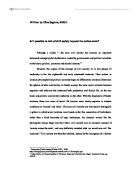A nationalist believes that the human race naturally consists of nations. These nations can be known by features that their members share, such as race, language or religion. The only rightful form of government is self-determination.
Creating a nation state can be done in many ways, and not just by the ways of Italy, 1789 (unifying an existing nation into a single state). Another way to achieve a nation state is for a nation to break away from an existing multinational state, such as the case of Greece, 1821-1833. Greece fought for independence from Ottoman Turkish rule. A Russian general led the Greek struggle. It was supported by Romanians and Serbs, also in revolt against the Ottoman Empire. They eventually forced the Ottoman ruler to accept Greek independence and grant limited self-rule to the Serbs.
Other nations having gained or re-gained their independence as states are Tajikistan, Turkmenistan, Ukraine and Uzbekistan (1991), Bosnia (1992), Slovakia (1993) and many more…
Supporters of the European Union, who hope that one day its members will merge into a European super state, can be seen as believers in a form of pan-Europeanism. In reality however, this is very unlikely to happen. The newly independent Eastern European countries that are eager to join the EU have only recently escaped from suppression by communist governments. They want to join the EU for reasons of prosperity and security, not to give up their national identities.
Sociologists believing is state centred theories are Skocpol and Nordlinger. State centred theories assume that a state has interests of its own. In other words, states are like social actors that can influence the environment around them, that is other states. I am not clear of Skocpol or Nordlinger’s opinions of super nations but both provide evidence for a strong sense of nation states.
Further from the above point, Skocpol sees that one of the main aims of a state is to increase their own power. This can be done in a number of ways. Skocpol says that “sheer sovereign integrity and the stable administrative control of a given territory are preconditions for any state’s ability to implement policies”. The state must command it’s territory or it will have no power to achieve its aims. To increase power, the state must have a reliable and substantial form of income and hire highly educated people into their ranks.
The step up from a nation state may seem to be a “super-nation”, such as the EU and other big bodies. A super-nation simply consists of a number of nations joined together. In studying bodies such as the EU, we see that countries are unifying to form this super-nation.
The European Union is an institutional framework for the construction of a united Europe. It was created after World War II to unite the nations of Europe economically so another war among them would be unthinkable. Twenty-five countries are members of the European Union.
The aims of the EU include the expansion of trade, reduction of competition, the abolition of restrictive trading practices, the encouragement of free movement of capital and labour within the alliance, and the establishment of a closer union among European people.
I personally feel that nationalism is a thing of the past. With a lengthy list of countries having gained or re-gained their own independence, is there really many more countries that can do this? With most countries having gained independence, the way forward is to unite with others forming a super nation such as the EU. Although super nations do have there disadvantages such as the members losing developed identity, the advantages such as the ones stated above do out count the disadvantages.
Stuart Small.







